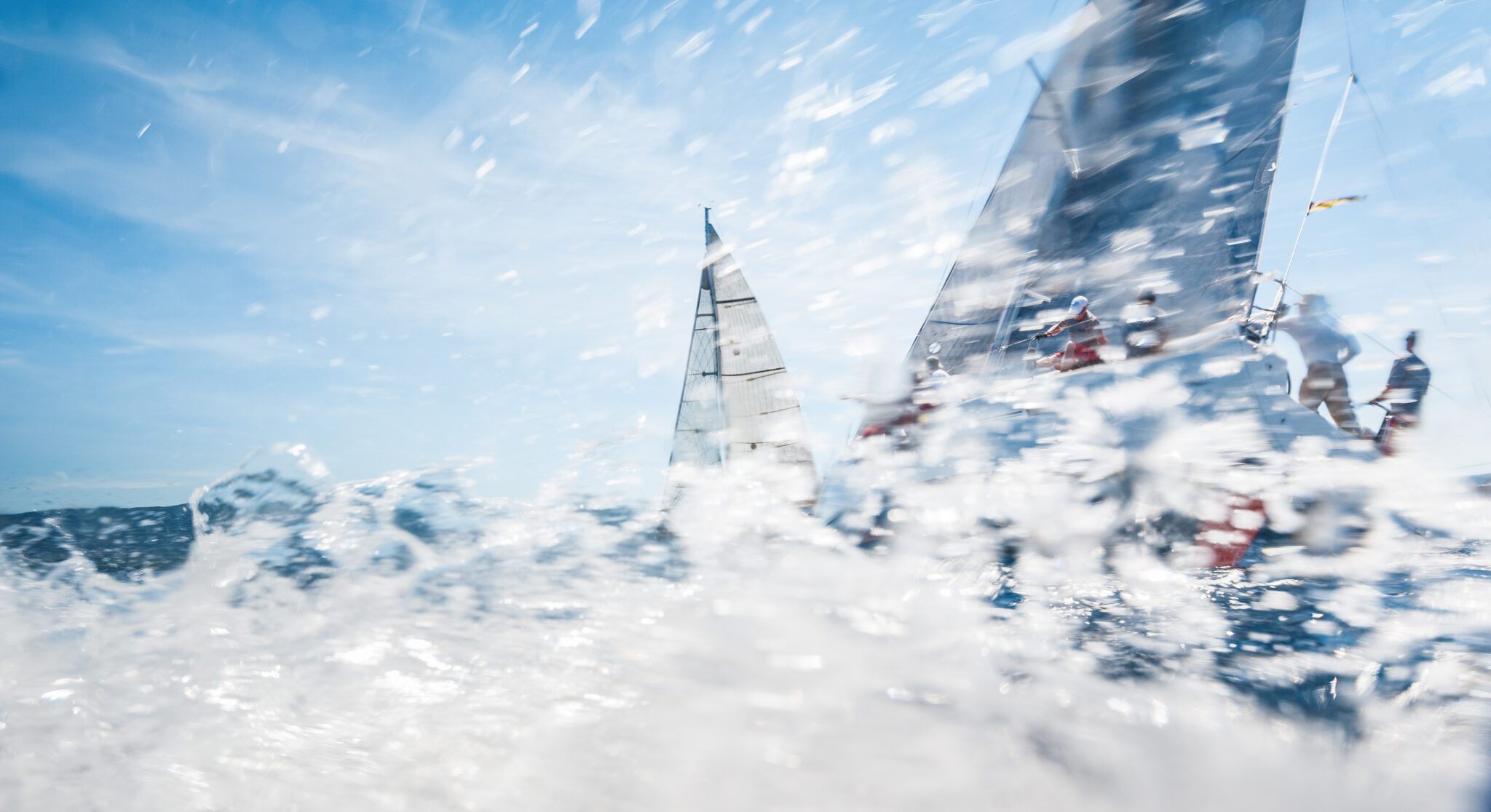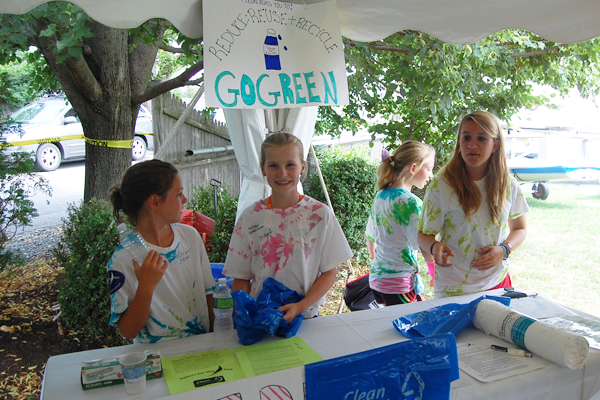
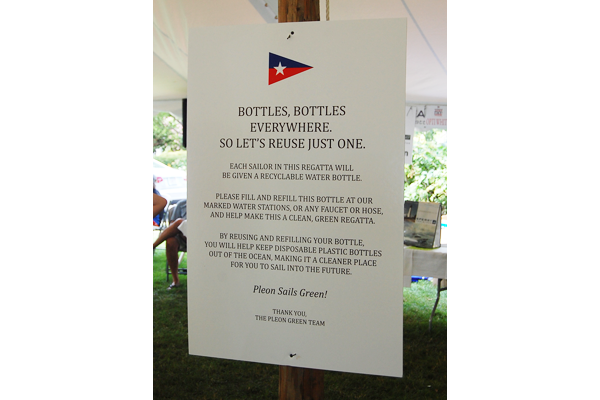
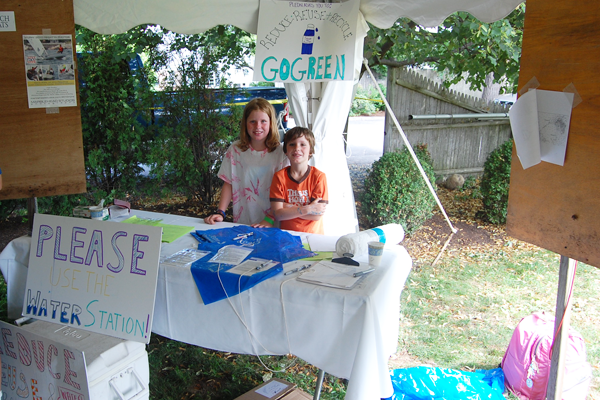
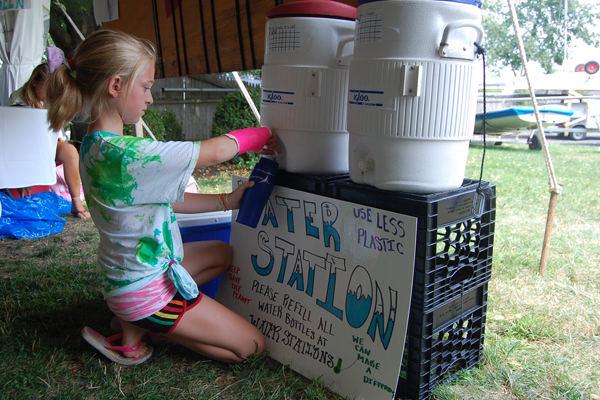
Marblehead Junior Race Week at Pleon Yacht Club is a perfect example of a junior regatta going completely right. There are a number of advantages and opportunities when running a Clean Regatta at a youth event. This is how Pleon Yacht Club met the challenges of running a Clean Regatta in an effective and elegant way.
Green Team
Pleon Yacht Club took full advantage of the enthusiasm of their members by putting together a great Green Team made up of several young members who didn’t happen to be racing in MJRW in 2010. The success of this Clean Regatta rested completely on the shoulders of these five young sailors, and Clean Regatta Liaison Betsy Hundahl. Starting their work well before the first gun, the Team filled coolers with ice and water, made signs pointing sailors to recycling and water refill stations, and wrote an inspiring speech, complete with a memorable chant to help racers remember the importance of reduce, reuse and recycle. If you have a junior program, consider enlisting some of your members to lead a Green Team for both youth and big boat regattas, or even as a permanent committee for the entire season.
Water Bottle Initiative
Pleon Yacht Club went all out to reduce the use of single-use plastic bottles at this event. At a site with no nearby access to running water, the Green Team took it on themselves to set up five water refill stations – one on the dock, one at the pier, one at the top of the boat ramp, and two in the food tent. The stations themselves were simply two 5-gallon igloo coolers with spigots, accompanied by clear signage communicating their purpose. When a cooler ran low on water, the Green Team, using a small red wagon, carted the cooler to the closest hose, refilled it, and returned it to its station. Upon each refill, they would make a tally mark on an attached note card to track how much water was used during the event. In this way, we were able to determine that they conserved 1080 individual plastic, disposable water bottles!
Local company and Sailors for the Sea collaborator Atlantis WeatherGear donated reusable water bottles for all the racers in Marblehead Junior Race Week. Racers were able to refill these bottles at the filling stations throughout the event. Due to the challenges of staying hydrated while on the water, some disposable bottles were in use, but MJRW’s goal is to try to establish on-the-water refill stations in future years. For more details on these water refill strategies, visit our Water Bottle Initiative Resource.
In the event that a sailor lost his or her bottle, they could be turned in to the Green Team information table and reclaimed later on. This was a well-used service during the event.
Recycling
In addition to existing trash and recycling bins at Pleon and Eastern Yacht Clubs, MJRW set up prominent recycling cans next to all trash cans in the food tent and entering the Dry Sail area. This is an important effort, as a hurried sailor with a bottle or can may simply throw it in the nearest bin, regardless of whether it contains recycling or not. By doubling up every trash can with a recycling bin, this insures that far more recyclables will make it to their destination.
For on-the-water trash capture, every coach and committee boat was supplied with a recycling and a trash bag to collect bottles, and trash from lunches throughout the day, which were then disposed of properly on shore.
Waste Reduction
In addition to the reduction in single-use plastics described above, MJRW also went some ways to reducing unnecessary waste in the creation of packaged lunches for Sailors on the Water. Rather than hand out pre-packaged lunches, MJRW set up a buffet-style table where sailors could put together their own choice of foods and drink for the day. This reduces packaging waste, as well as the waste of food that often comes from giving a large group identical meals. One sailor may like the apple, but not the granola bar, and vice versa. Ultimately, this strategy also saves the host yacht club money as they do not need to purchase as much food, some of which ends up in the bin, untouched.
Communication
As we’ve stated before, communication can make or break your Clean Regatta. If racers and spectators don’t know what you’re doing, that can seriously detract from your ability to make a big difference. When it comes to ocean stewardship, we need all the help we can get! Here’s what MJRW did to let everyone know about Clean Regattas:
- Emailed all regatta committee members about the intention to requested their participation supporting the effort;
- Posted Clean Regatta and Sailors for the Sea logos, as well as Clean Regattas Pledge on regatta site, NOR, and banners around the event;
- Send Clean Regattas email blast to all registered racers;
- Set up a Clean Regattas table at registration to showcase Clean Boating resources and provide water bottles, brochures and recycling bags to coaches and racers;
- Clear and apparent signage for all water stations, recycling bins, etc.
- Clean Regatta Liaison and Green Team presented at skippers meeting, coach/safety boat meeting and the efforts of the program;
- Invited Sailors for the Sea staff to attend the awards ceremony and present certificate to the yacht club.
Other
In addition to the above, MJRW also included information on non-toxic cleaning products and water bottle instructions in registration bags. The registration bags themselves were made of recycled material, and regatta t-shirts were made of organic cotton.


